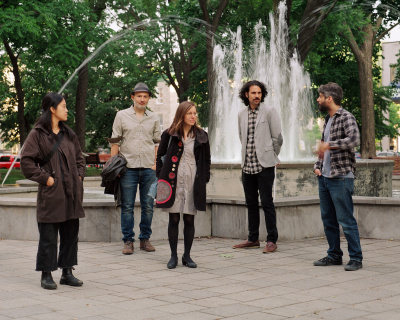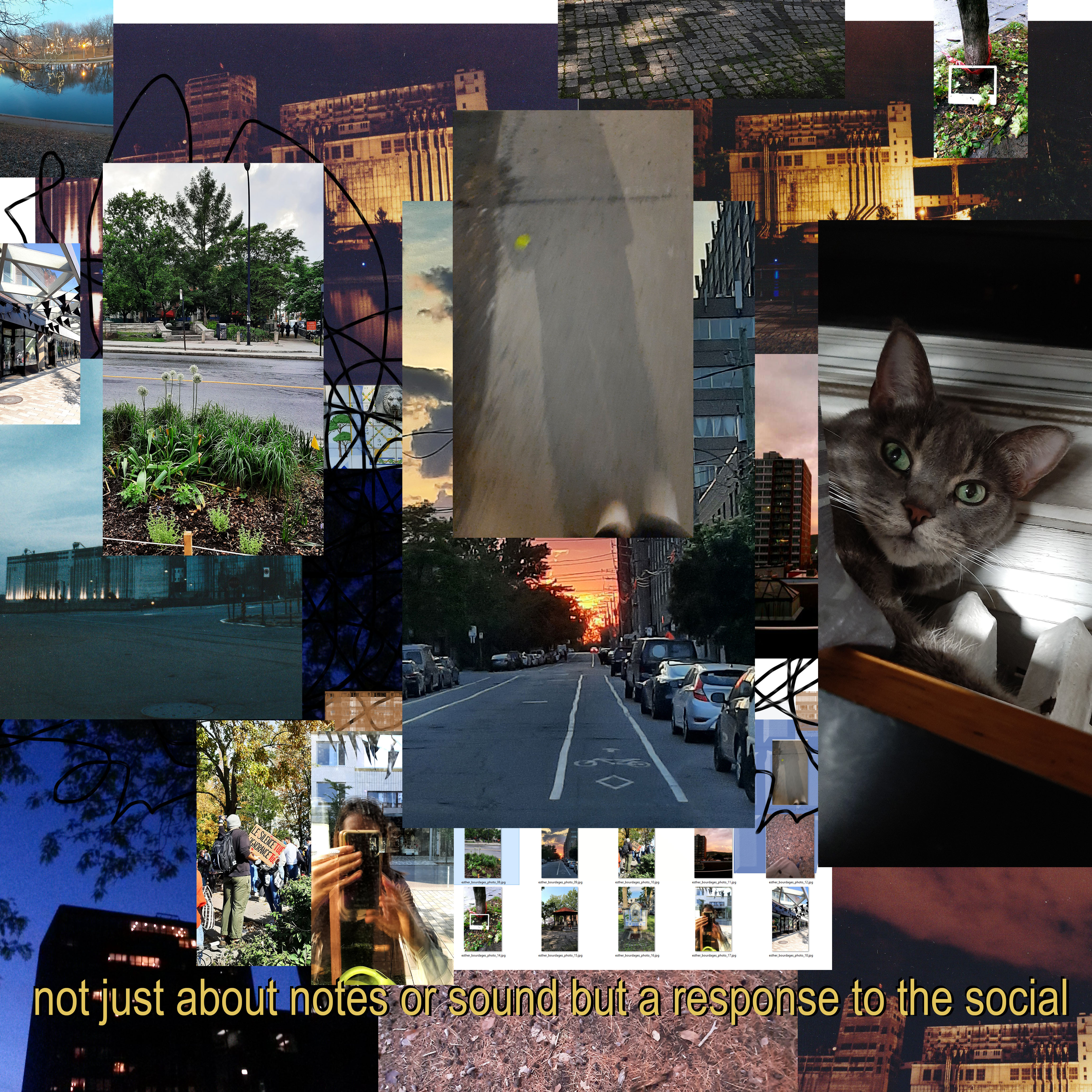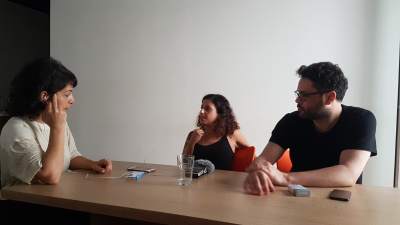Montréal, Your Ears Are My Island
Episode 7 of the TIMEZONES podcast series, co-initiated and co-produced by Norient and the Goethe-Institut. This episode portrays the diverse music scenes of Montréal. Producer Esther Bourdages traces their global connections and historical roots and explores the effects of gentrification on the city’s cultural life.
I produced a subjective portrait of Montréal’s music through five different voices and five musicians who both live and play music in Montréal. Adam Basanta, Silvano Mercado, Mili Hong, Joseph Sannicandro, and Kimihiro Yasaka are from different geographic areas and work across diverse practices, from sound art to jazz, experimental, contemporary, classical, and world music.
Artist, researcher, writer, and theorist Budhaditya Chattopadhyay inspired me when he stated: «Sound as a creative media socially connects people and places through its manifold travels.» Music has the power to reunite people, musicians, and audiences. I aim to portray the unique touch of Montréal’s music scenes and what it makes possible.
I look to explore, underscore, and analyze the favorable conditions of Montréal’s music scenes that are already rich and developing. The fervor of musicians is often the motor that contributes to building the fabric of the music communities. Musicians share collective experiences, and cultural values are negotiated: openness to the other, welcoming Montréal music scenes, and engagement are the keys. The persona of Montréal’s music is the result of its history, the economic context of a low-cost cosmopolitan city, and the overlap of immigration. The music scenes in Montréal embrace and celebrate multicultural heritages.
Finally, the interviews capture the challenges of being a musician in Montréal, a hip, bohemian international city, highlighting new shifts and new transitions that are slowly cropping up as effects of gentrification. Those changes affect the structure of musicians’ lives. On that note, I interrogate how sustainability echoes the conveniences of modern life.
I would like to thank all the artists participants, Silvano Mercado for the co-editing, mixing, sound design, Hannes Liechti, Svetlana Maraš, and the Goethe-Institut.
A podcast by Esther Bourdegas
Co-initiated and co-produced by Norient and the Goethe-Institut
Featuring: Adam Basanta, Mili Hong, Silvano Mercado Vilches, Joseph Sannicandro, Kimihiro Yasaka
Artistic Editor: Svetlana Maraš
Project Management: Hannes Liechti
Group Photos: Claudia Goulet-Blais
Jingle Voiceover: Nana Akosua Hanson
Jingle Mix: Daniel Jakob
Mastering: Adi Flück, Centraldubs
Artwork: Šejma Fere
→ Full transcript of episode 7
Listen On



→ Listen to further TIMEZONES episodes
Featured Artists

Adam Basanta is an artist, composer, and performer of experimental music. Born in Tel-Aviv and raised in Vancouver, he has been living and working in Montréal since 2010. Since 2015, his works have been exhibited in international galleries and institutions and won several international prizes, including the Japan Media Arts Prize (2016) and the Aesthetica Art Prize (2017). Remaining active as an experimental composer and performer, his concert music, live performances, and sound recordings have been presented worldwide and won multiple national and international awards.
Mili Hong began playing drums at the age of 16. She spent most of her life in South Korea before moving to Vancouver, Canada, in her early 20s to study English and music. Although she originally planned to move back to Korea after completing her studies, she decided to remain in Vancouver to experiment and explore her new life in Canada’s thriving and diverse music scene. She received a Bachelor of Music in Jazz Studies from Capilano University, majoring in Instrumental Performance, and played in various ensembles from small combos to big bands, presenting her with numerous opportunities to explore different styles of drumming.
Silvano Mercado Vilches is a Parisian of Franco-Chilean origin. He attended the conservatory from an early age and grew up in a very diverse artistic and musical universe. While his career as an instrumentalist and composer takes shape between Latin music, jazz, and electro folk, his love of cinema naturally led him to music for images. This discipline, ideal for tapping into all styles, allows him to share his work between composition and sound creation, leading him to working professionally in several fields: fiction, documentary, experimental, and live improvisation.
Joseph Sannicandro is a writer, sound organizer, and traveler currently living in Montréal. He writes about miss-communication, (un)popular culture, and the labor of creativity and is interested in the analog humanities. Joseph is a PhD candidate in cultural studies and comparative literature at the University of Minnesota. His work has appeared in eContact, .dpi, Carceral Notebooks, the Journal for Sonic Studies, and edited book collections. His dissertation, currently in progress, explores the nature of doing things together through a cultural history of aesthetics and politics in post-1968 Italy.
Kimihiro Yasaka is a Japan native, an active pianist, and a recording artist as well as an enthusiastic educator. He began his piano studies at the age of twelve with Ms. Reiko Mizutani in Japan and went on to completing his Master’s degree in Piano Solo Performance under the supervision of Professor Kyoko Hashimoto at the Schulich School of Music at McGill University in Montréal. Yasaka’s repertoire includes a wide range of styles from Baroque to contemporary music. He is a particularly devoted performer of new music and has performed in several Montréal, Canadian and world premieres.
Bonus Talk
Artists on Real Estate Monsters and Montréal
moderated and produced by Stefan Christoff
In this bonus talk, we hear the producer of the TIMEZONES Tiohtià:ke / Montréal podcast, sound artist, curator and radio host Esther Bourdages, along with the voice of sound artist and academic Joseph Sannicandro. Stefan speaks with both artists about one of the major themes emerging from the main podcast episode: the struggle and debate around access to creative spaces within the urban environment in the context of gentrification and the growing pressures of real estate capital. How can artists survive, overcome, and resist gentrification?
Musically interwoven into this edition is a segment of the duet track «Orbiting Mercury in a Dream» by bonus talk moderator and producer Stefan Christoff (organ) and Joseph Sannicandro. The piece was released by Élan Vital, a label based in North Macedonia, on the album La lumière du soleil dans un semi sous-sol. View a beautiful video by Guillaume Vallée that accompanies this track.
Stefan Christoff is a community radio host, musician, social activist, and student living in Tiohtià:ke / Montréal. Stefan hosts Free City Radio, a weekly podcast and radio program that airs in the city on CKUT 90.3fm, focusing on the intersections between social justice movements and the arts. As a community activist, Stefan has been deeply involved in migrant justice movements, challenging the violence of the Canadian state’s migration policies that attack the fundamental rights of asylum seekers, non-status people, and immigrants. Stefan has created many albums with artists both locally and internationally, including duet albums with Sam Shalabi, Lori Goldston and as part of Anarchist Mountains and Rêves sonores.
Playlist
Explore a playlist of artists featured in the TIMEZONES Montréal podcast, their collaborators, and their peers in the Montréal community.
Curated by Esther Bourdages
Credits Samples Processed
Adam Basanta. 2016. A Room Listening to Itself, Cassauna / Important Records.
blablatrains (Ana Dall'Ara-Majek and Takuto Fukuda). 2019. «Pythagorean Domino».
Caloia, Epps, Lauzier, Nakatani. 2020. «2sd Set». Live at Café Résonance. Mr. E Records (#14).
Chris Paul Harman. Performed by Kimihiro Yasaka. 2019–20. «Billboard Ver 1: Peg, Here Comed the Rain».
Claude Vivier. Performed by Ensemble Constantinople & Guests, directed by Sandeep Bhagwati. 2019. «Vivier 1», «Bols». … et je reverrai cette ville étrange. Dreyer gaido (21119).
David Kristian. 1999. «Loomis». Room Tone. Alien8 Recordings (ALIENCD19).
Erik Hove Chamber Ensemble. 2017. «Morce Code». Polygon, Inner Circle Music.
Geraldine Eguiluz Sextet. 2021. «Tamales Oaxaquenos». Mexhicah Bones. Studio recording.
Ida Toninato, Jennifer Thiessen. 2018. «Unknow Road». The Space Between US. Ambiances Magnétiques (AM 236).
Ijo, Ivetta Sunyoung Kang. 2020. «Anterior Skin [leftover]».
Jason Sharp. 2018. «Stand Above the Streams, Pt. 1». Stand Above The Streams. Constellation Records.
Jean Derome. 2001. «Dernier Paysage». Canot-Camping: Expédition 4. Ambiances Magnétiques (AM 100).
Lori Freedman. 2019. «Withwhatbecomes». Excess. Collection QB (CQB 1923).
Lynda Gaudreau, Martin Tétreault. 2007. «Tourne-disque No 1, sections 1-2-3». Document 4: A Choreographic Project.
Mili Hong. 2019. «[Experior::04]». Live @ experior::04.
Norsola. 2018. «For Ezra». Howl Live. Howl Arts collective.
Rêves sonores (Nick Schofield and Stefan Christoff). 2021. «Spirodon». Crépuscule. Youngbloods (YBZ032).
Sam Shalabi. 2001. «Outside Chance (Dreamfangs)». On Hashish. Alien8 Recordings (ALIENCD29).
Silvano Mercado Vilches. 2010; 2015. «Phy, Tribal». PHY, TRIBAL.
Simon Bertrand. Performed by Kimihiro Yasaka. 2009–10. «La lune». 22 Miniatures for Piano.
Stefan Christoff & Sam Shalabi. 2014. «Elephantine». Flying Street, Howl Arts Collective.
The TIMEZONES podcast series plunges into the world of artists and their practices, asking: what does living and working in culture and the arts involve in different countries, cities, and contexts today? The artists’ thoughts on their moods, their social, political, and intellectual realities and their philosophies (of life) have been worked up into experimental audio collages.
The podcasts run the gamut of formats and content, from straight journalism to experimental and documentary approaches, ethnography and fiction, sound art, and improvisation. The TIMEZONES series endeavours to create new artistic forms of storytelling, listening and exchange across the boundaries of geography, time zones, genres, and practices.
The TIMEZONES podcast series is co-initiated and co-produced by Norient and the Goethe-Institut.
Biography
Shop



Published on December 30, 2021
Last updated on October 12, 2023
Topics
Snap






